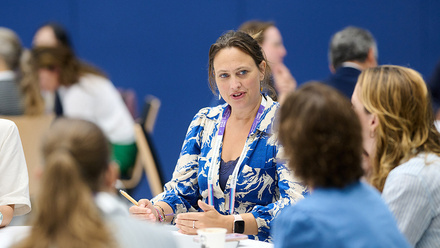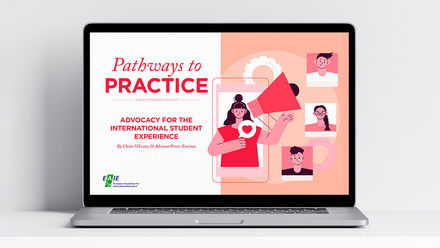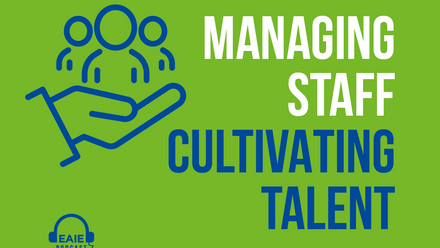Staff development for a truly international campus

To achieve a truly international campus, it is crucial for higher education institutions to raise awareness and offer international opportunities to administrative staff. After all, these are the people who carry out the daily international affairs. But how do we build initiatives that contribute to the professional development of university staff while ensuring that we reach a higher level of internationalisation?
While most institutions have either developed an internationalisation strategy or at least implemented internationalisation measures, such actions are often limited to the fields of education (developing courses in a foreign language, setting up double degrees and mobility funding schemes, providing administrative support) or research (facilitating researcher’s mobility, providing welcome services, developing seed funding schemes to encourage international partnerships).
The majority of these measures target students and academic staff, leaving aside administrative staff. However, these are the very people who carry out the daily operations of the university and who may therefore ensure a multi-dimensional implementation of internationalisation so that it then becomes a truly embedded principle within the university’s core values. Moreover, the benefits resulting from international staff development initiatives for administrative staff are multiple: they contribute to the development of high-quality services, improve individual performance of staff, support innovation in the institution’s organisation and can also promote international partnerships.
Staff professionalisation in France
In comparison to other European countries, internationalisation is a relatively new concept in the French academic context. Nevertheless, it would appear that being new can be an advantage and provide opportunities to develop innovative initiatives!
Administrative staff mobility can trigger a virtuous circle where internationalisation, talent management and institutional innovation support one another
In the case of the University of Bordeaux, internationalisation was one of the first priorities identified in the university’s institutional strategy. This all-encompassing strategic plan covers the many missions of a university: research, training, societal impact and institutional effectiveness. Internationalisation appears as a cross-functional priority along with talent management (how we attract the best staff and students and how we provide a nurturing environment in which staff and students may develop their skills). It is seen as an opportunity to improve the overall performance of the university.
Administrative staff mobility is recognised as a tool to trigger a virtuous circle where internationalisation, talent management and institutional innovation support one another. By providing internationalisation opportunities for staff, we ensure that they bring home best practices for their work environment, which increases the effectiveness of the university as a whole, while expanding their own career opportunities, improving their intercultural skills, and finally cultivating an international environment for the entire community.
A new programme to engage the entire administration
With the support of the Bordeaux Initiative of Excellence, a new career development programme was implemented at the University of Bordeaux in 2017-2018, to support individual and collective internationalisation projects. These projects involve a mobility period and contribute to professional development via the acquisition of new skills and expertise, the sharing of best practices and the discovery of organisational innovations.
Based on the traditional Erasmus+ European staff mobility programmes, the Bordeaux programme goes even further, with several key features:
• Targeting of all administrative staff. The programme is not limited to international officers or central services or executives. This is a very important dimension: we aim at diversity to achieve our objectives of comprehensive internationalisation.
• Focus on internationalisation projects as a key lever for professional development. Thanks to skills acquired via international mobility, we hope to encourage the evolution of institutional practices and to facilitate organisational innovation.
• Support of cross-functional team projects. By acquiring new ‘outside the box’ skills and know-how from international mobility, we help teams (management, department, business group) with their evolution process, organisational innovation and/or the development of new user services. These team projects can involve one or several departments within the university – there is no limit to the number of mobility projects as long as they all support the same objective.
With these features in place, the career development programme presents a powerful tool for incorporating staff in the overall internationalisation of the institution.
Good practices for staff career development
Even though it is difficult to have a full picture of the impact of this initiative due to its relatively recent launch, we can already identify a few recommendations for developing this type of programme:
- Encourage a multi-dimensional, strategic approach where internationalisation is part of a virtuous circle that supports institutional innovation and staff development/talent management.
- Obtain support from the highest level in your institution and make sure the leaders are involved in the whole process (design of the programme, evaluation of application, impact study, communication with the community, etc).
- Aim for a target audience that is as wide as possible and include all administrative staff (regardless of function/service).
- Provide as much help as possible with the preparation of mobility projects, in terms of language and intercultural development but also for project design. This is why it is crucial that the programme be managed by a cross-functional team, gathering expertise from different backgrounds (human resources, international office, change management, etc).
- Make sure your expectations in terms of professional outcomes are very explicit and reflect on how you can promote these projects through their impact on the career path of your colleagues (integration in yearly professional interview, new criteria for promotion opportunities, development of open online certification for administrative staff).
John Hudzik’s definition of comprehensive internationalisation accurately highlights what is at stake in our institutions today. Indeed, it clearly shows the institutional and cross-functional dimension of successful internationalisation and how it should be embedded in the institution’s values and strategy. Even though our institutions are starting to understand this imperative and adhering to the principles of comprehensive internationalisation, there is still a long way to go when it comes to implementation in local contexts. And if we want to develop truly international campuses, staff professionalisation is a good place to start.






